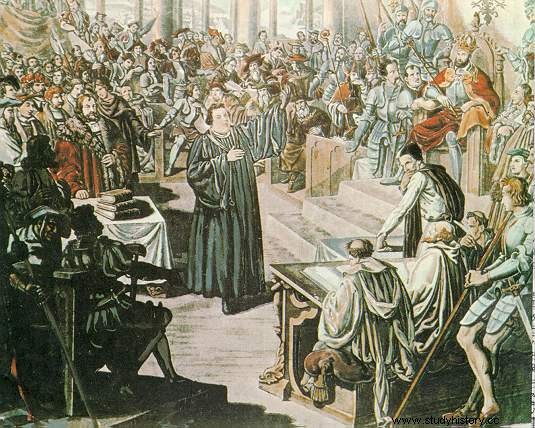
By Demercino Junior
Southwest of Germany, in the Rhineland-Palatinate state, is the city of Worms, which is known for the manufacture of white wine Liebfraumilch , for its chemical and metallurgical industries and for having hosted, on January 28, 1521, an assembly, convened by Emperor Charles V, who judged Martin Luther for crimes committed against the Catholic Church:it was the so-called Worms Diet.
The word diet comes from the Latin díaita (way of living). According to the Michaelis dictionary, “diet” has two meanings:diet and political or administrative assembly. Let's stick with the second definition.
Martin Luther (Martin Luther) was a German priest who, in 1517, severely criticized the Catholic Church regarding the demand for indulgences, the protectionism of the Bible and unfounded religious practices. A clerical member and professor of theology, Luther started a manifesto against the Church, called the Protestant Reformation. He was also responsible for translating the Bible from Latin into German. Because it was written in Latin, only the clergy had access to the Holy Scriptures and Luther defended that reading the Bible was for everyone. Luther collected all his criticisms in a document entitled “The 95 Theses”.
In 1520, Pope Leo X, annoyed, wrote a document demanding Luther's recantation, on pain of his excommunication. In the public square, Luther responded by setting fire to the Pope's document. A political crisis broke out in Germany. Luther was called to recant.
When he arrived at the Assembly, Luther was introduced to his books, displayed on a table. When asked if the books were his own, he replied yes. He was submitted to the second question: “Do you agree with the content written there or do you want to retract?”. Luther, resentful, asked for time to respond. You were given a 24-hour deadline. The other day Luther replied:“Unless it can be refuted and convinced by the testimony of Scripture and by clear arguments (since I do not believe in the pope, nor in the councils; it is evident that they all often err and contradict each other); I am conquered by the Holy Scripture quoted by me, my conscience is captive to the Word of God:I cannot and will not retract, for it is unsafe and dangerous to do something against conscience. This is my position. I cannot do otherwise. God help me. Amen!”.
Luther was saved from the death penalty (he died a natural death in 1546), but was excommunicated. His words against the charging of indulgences (salvation) and simony (sales of falsely sacred religious articles) shook the pillars of the Catholic Church, making it more humane and less deceitful, and influenced the emergence of the Protestant Church.
